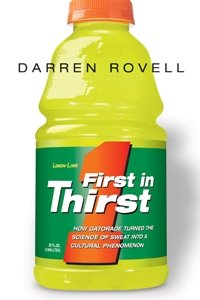 For everything you wanted to know about Gatorade but were afraid to ask, pick up First in Thirst. Its author, Darren Rovell, covers the business of sports for ESPN, which sounds like a terrific job until you realize that he has to live in Bristol, Connecticut, or what Keith Olbermann once called "the most godforsaken place on the Eastern Seaboard."
For everything you wanted to know about Gatorade but were afraid to ask, pick up First in Thirst. Its author, Darren Rovell, covers the business of sports for ESPN, which sounds like a terrific job until you realize that he has to live in Bristol, Connecticut, or what Keith Olbermann once called "the most godforsaken place on the Eastern Seaboard."Rovell writes the story of Gatorade, from its humble origins in a University of Florida lab to the dominant player in the sports drink market. (Legal note: Gatorade owns an 80+ percent market share, but probably gets left alone by the Department of Justice because it created that market, and earned its market position without violating any antitrust laws.)
Using the lesser recruits of the freshman football team as guinea pigs, four scientists determined that a salty solution was better than water at replenishing the 5-10 pounds of sweat that a player may lose in game conditions under the Gainesville heat. Better yet, the players could avoid the kind of muscle cramping that excessive amounts of water caused, and could play with more endurance in the second half. Gatorade soon graduated to varsity, and the effects were immediate.
The spread of Gatorade's early popularity was inexpensive and clever. In a tactic that Malcolm Gladwell might appreciate, Gatorade was given to the trainers on college teams, who peddled their influence to the coaches and players. Orange coolers and green cups were provided, and the trainers knew just what to do with them to create the maximum amount of TV exposure. In essence, Gatorade invented product placement in the sports world.
Gatorade benefited from a lot of happy accidents. The practice of dumping Gatorade on winning coaches began earnestly with the New York Giants in their championship season. When Gatorade took a chance on a single athlete to endorse their product, they went with Michael Jordan. The "Be Like Mike" song was quickly written by a pitchman who'd seen The Jungle Book with his kid and wanted to do something similar to the song "I Wanna Be Like You."
Rovell doesn't have a lot of bad things to say about Gatorade. Their good ideas were extremely successful; their bad ideas (Gatorade Light?) were quickly dropped. I had expected corporate infighting, or nasty business practices when Coke's Powerade or Pepsi's All Sport tried to move in. But it was basically clean competition. I suppose there's nothing wrong with depicting a positive business model. Not every business success story has to have a body count.
Finally, in what I think is a much better idea than adding material to a paperback edition, Rovell ran a Gatorade-themed blog here. (In it, you'll see Gatorade's good luck streak continues: they signed Dwyane Wade months before Miami won the NBA title, and his asking price went up.) He stopped updating it recently, but it still makes an excellent afterword.

3 comments:
That was an interesting post. Do you think this "hyperhidrosis"/ "excessive sweat" comment spam is for real?
The links are real.
Of course, now that you've commented on hyperhidrosis, I have to keep that first comment.
So, here goes:
Readers are free to comment on posts made in "Brevity is... wit", but such comments may be deleted at the author's discretion. Furthermore, the author makes no endorsement of the opinions from these comments.
I considered throwing a "Witnesseth" in there but thought better of it.
How do you notarize a blog?
I remember thinking that Gatorade gum tasted like sweat. Nasty stuff.
Post a Comment